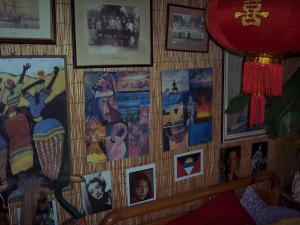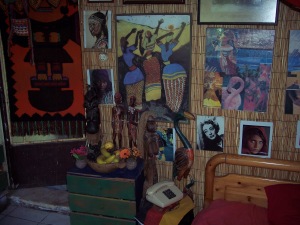From our flat in Pireaus, where we lived for two years, there is a splendid view across Faliron Bay in the direction of the old airport. Washing up didn’t seem so painful when you could watch the yachts sail past and, now and again, a school of dolphins. 90 degrees in the other direction afforded a view of the island of Aegina. Many evenings I would sit on my bedroom balcony and look at the twinkling lights of Souvala village. One day I wanted to spend an evening there and look back at Pireaus. The chance came when our dear Italian friend, Pierra phoned to say she would be on Aegina for a week and did we want to meet up.
Pierra had been married and divorced twice. She claimed she couldn’t even remember the names of her ex-husbands because ‘they were not interesting people’. The only thing she remembered, according to her, was that they were both Greek. She is Protestant, with an unruly explosion of blonde hair, is unable to cook, is not in the least interested in fashion, and drinks wine directly from the bottle – very un-Italian in every way in other words, and lots of bubbly fun.
She was happy to spend the evening in Souvala with us. First of all though, we had to book into our favourite pension in Aegina Town, run by a young man named Stelios.
‘How about a room with balcony in the front, Stelio?’ I enquired.
‘Sorry, I only have room in my behind.’ he replied.
Now, at this point does one correct his English or not to save him possible future embarrassment? No, leave it. Charming as it is.
‘OK, that’s fine.’
The taverna on the beach in Souvala was relaxed, the service slow, but friendly. I fulfilled my ambition to look back across the water towards our flat, as we worked our way through some fried fish and a salad, but at one point we decided there wasn’t enough food. We were still hungry.
‘How about sharing a portion of moussaka?’ suggested Brian.
The waiter had our moussaka on the table in record time. I cut off a quarter and slid it onto Pierra’s plate and then took a quarter for myself. At that moment the waiter returned and snatched to plate back from me.
‘Sorry,’ he said,’ but this moussaka is for that table over there. I make mistake.’
‘But we’ve just eaten half of it.’
‘Doesn’t matter. No problem.‘
He put the dish down in front of a young English couple at the next table.
‘I’m terribly sorry,’ I said, ‘let me buy you something else. We’ve eaten half of your supper.’
‘That’s all right,’ the man said meekly, ‘this is enough for us.’
We sent them over half a litre of wine anyway, and started to chat. I assumed they were on their honeymoon, but didn’t ask. Then the waiter brought us a half litre of wine on the house. It turned out to be a fun evening with plenty of food and conversation, and when it was over we walked slowly back to the main town of Aegina, where we finished the evening with coffee and ice cream.
‘That was great. Now I hope I get a good night in Stelios’ behind.’
Pierra gave me a quizzical look.
‘Mamma mia,’ she said, ‘you English never fail to surprise.’








